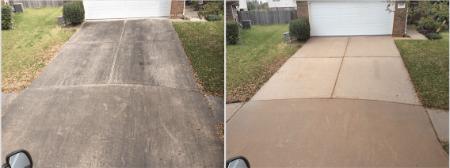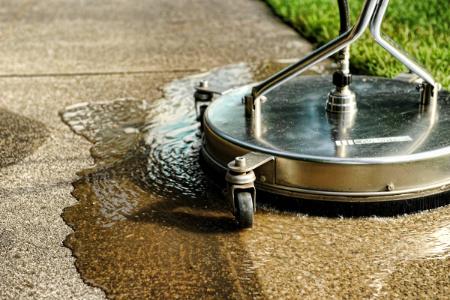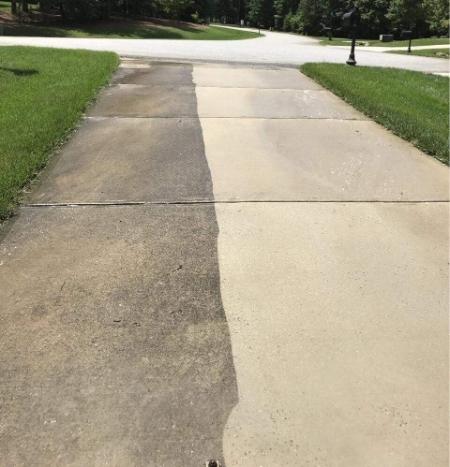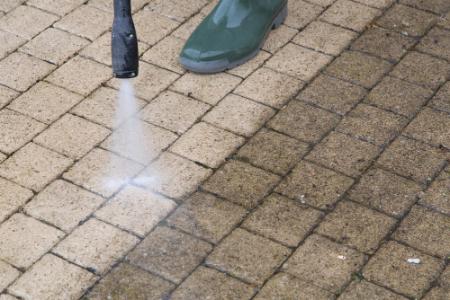How To Wash Your Driveway in 2024?

So, you’ve noticed your driveway is looking a bit grimy and dull? Don’t worry, you’re not alone! Many homeowners face the challenge of keeping their driveways in top shape. That’s where pressure washing comes in.
Pressure washing is like giving your driveway a deep clean, using a high-pressure stream of water to blast away dirt, grime, and stains. It’s not just about making your driveway look nicer—this process actually helps extend its lifespan. Over time, dirt and algae can cause damage, and pressure washing can help prevent that by removing contaminants that lead to wear and tear.
In this guide, we’re diving into everything you need to know about pressure washing your driveway, including:
- How much you can expect to pay in 2024.
- The best tools to use
- All the steps to follow
- DIY Tips
Whether you’re tackling the job yourself or considering hiring a pro, this information will help you make the best choices for your home and budget.
How Much Is Driveway Cleaning?
When it comes to driveway cleaning, understanding the costs involved helps you budget effectively, whether you’re tackling the job yourself or hiring a professional. Here’s a breakdown of what you can expect to pay in 2024:
- Factors Influencing Cost: Size of the Driveway:Larger driveways will naturally cost more to clean than smaller ones. Most services charge based on square footage.
- Type of Surface: Different surfaces require different cleaning approaches. Concrete is usually less expensive to clean compared to more delicate surfaces like asphalt or pavers.
- Severity of Stains: If your driveway has heavy staining or mold, additional treatments and more intensive cleaning might be needed, which can increase the cost.
- Location: Costs can vary depending on your geographic location. Urban areas might have higher rates compared to rural locations.
DIY Pressure Washing:
Renting a pressure washer typically costs between $50 and $250 per day, depending on the model and your location. Additionally, you might need to purchase or rent cleaning detergents and protective gear, which could add another $20 to $50.
Professional Cleaning Services:
Hiring a professional typically ranges from $200 to $500 for a standard driveway cleaning. The price varies based on the factors mentioned above, such as size and condition of the driveway. For specialized services or large areas, costs can exceed this range.
DIY vs. Professional Cleaning:
- DIY Cleaning: If you’re comfortable with handling a pressure washer and have the time, doing it yourself can be more cost-effective. However, it requires effort and the proper equipment.
- Professional Services: Hiring a professional can save you time and ensure the job is done thoroughly and safely. It’s ideal if you prefer to avoid the hassle or if your driveway needs extensive cleaning. While it costs more, the convenience and expertise might be worth the investment.
Types of Pressure Washers:

When it comes to pressure washing your driveway, the type of pressure washer you use can make a big difference. Let’s break down the two main options: gas and electric models, so you can choose what’s best for your needs.
Gas Pressure Washers:
These are the heavyweights of the pressure washing world. They’re powerful, with higher pressure outputs, making them ideal for tackling tough stains and large driveways. Gas models are typically more portable, so you’re not tethered by a power cord. If you’ve got a large driveway or need to clean frequently, a gas pressure washer might be the way to go. However, keep in mind that they can be noisy and require regular maintenance like oil changes.
Pros:
- Powerful with higher pressure outputs
- Ideal for tough stains and large driveways
- Typically more portable, not limited by a power
- Suitable for frequent use and large areas
Cons:
- Can be noisy
- Requires regular maintenance, such as oil changes
Electric Pressure Washers:
These are often a better choice for smaller driveways or occasional use. They’re generally quieter, lighter, and easier to start—just plug them in, and you’re good to go. Electric models usually have lower pressure compared to gas ones, but they’re more convenient for light to moderate cleaning jobs. They’re also less maintenance-intensive, which can be a big plus if you prefer something straightforward.
Pros:
- Quieter and lighter
- Easier to start (just plug in)
- Lower maintenance requirements
- Convenient for light to moderate cleaning jobs
- Ideal for smaller driveways or occasional use
Cons:
- Generally lower pressure compared to gas models
- Limited mobility due to power cord
Essential Equipment and Supplies
To get your driveway looking its best, you’ll need more than just a pressure washer. Here’s a rundown of the essential equipment and supplies to ensure you have everything you need for a successful cleaning job:
Pressure Washers:

First and foremost, you need a reliable pressure washer. As mentioned earlier, you can choose between gas and electric models based on your needs. When selecting a pressure washer, consider the PSI (pounds per square inch) rating; higher PSI means more power. For most driveways, a model with 2,500 to 3,000 PSI should do the trick.
Nozzles and Attachments:
Different nozzles can dramatically change your cleaning results. Here are a few you might need:
Turbo Nozzle:
This nozzle creates a rotating jet of water that’s perfect for blasting away tough stains and grime.
Surface Cleaner:
This attachment is great for covering large areas quickly and evenly, reducing streaks and uneven cleaning.
Soap Nozzle:
Typically a low-pressure nozzle used for applying detergent.
Detergents and Cleaning Agents:
Choosing the right cleaner is crucial. For most driveways, you’ll need a detergent that’s specifically designed for pressure washing.
Degreasers:
Effective for removing oil and grease stains.
Mold and Mildew Removers:
Useful if your driveway has green or black stains from mold or mildew.
General Cleaners:
A good all-purpose cleaner can tackle dirt and general grime.
Safety Gear:
Never underestimate the importance of safety. Pressure washing involves high-pressure water streams that can cause injury or damage if not handled properly. Make sure to wear:
Protective Eyewear:
To shield your eyes from flying debris and chemicals.
Gloves:
To protect your hands from chemicals and the high-pressure water.
Having these tools and supplies ready will help ensure your driveway cleaning goes smoothly and safely.
Preparation Steps
Before you dive into pressure washing your driveway, a little preparation goes a long way in ensuring the job is done effectively and safely. Here’s how to get everything ready:
- Preparing the Driveway: Start by clearing your driveway of any items that might get in the way. Move cars, bikes, garden tools, and any outdoor furniture. It’s also a good idea to pick up loose debris like leaves and sticks. This will make sure that you can reach every part of your driveway and avoid any accidents or damage to your belongings.
- Protecting Surrounding Areas: Pressure washing can send water and cleaning solutions flying, so you’ll want to protect anything nearby. Cover plants, flower beds, and any outdoor furniture with plastic sheeting or tarps. This will prevent the pressure washer from causing damage or accidentally spraying cleaning agents onto these areas. If you have walls or fences close to the driveway, consider using a plastic cover or painter’s tape to shield them as well.
- Checking for and Addressing Potential Issues: Inspect your driveway for any visible cracks or damage. If you find any, it’s a good idea to repair them before pressure washing. Washing over cracked or damaged areas might worsen the issues or allow water to seep in, which can cause further damage.
Techniques for Different Surfaces

Different types of driveways require different cleaning techniques to get the best results without causing damage. Here’s how to handle the three most common driveway surfaces:
Concrete Driveways:
Concrete driveways are durable but can accumulate tough stains over time. Here’s how to tackle them:
- Pre-Wet the Surface: Begin by spraying the driveway with water to loosen dirt and grime. This also helps prevent the concrete from absorbing too much detergent.
- Apply Detergent (If Necessary): Use a concrete cleaner or a general-purpose detergent. Apply it evenly across the surface and let it sit for 10-15 minutes to break down stains.
- Pressure Wash: Use a pressure washer with a 25-degree nozzle. Start from one end and work your way to the other, keeping the nozzle at a consistent distance (about 12 inches) from the surface to avoid damaging the concrete. Move in overlapping strokes for even coverage.
- Rinse Thoroughly: Rinse the driveway with clean water, ensuring all detergent and debris are washed away.
Asphalt Driveways:
Asphalt is a bit more delicate than concrete, so you’ll need to be gentle:
- Pre-Wet the Surface: Similar to concrete, start by soaking the driveway to loosen dirt and debris.
- Use Mild Detergent (If Necessary): Opt for a mild cleaner that won’t damage the asphalt. Avoid strong chemicals that can break down the asphalt over time.
- Pressure Wash: Use a pressure washer with a 40-degree nozzle to prevent excessive force that could strip away the asphalt surface. Maintain a safe distance of about 18 inches from the surface and clean in a back-and-forth motion.
- Rinse Well: Make sure to rinse thoroughly to remove all cleaning agents.
Paver Driveways:
Paver driveways are unique because they have joints filled with sand. Here’s how to clean them properly:
- Pre-Wet the Surface: Begin by spraying the pavers to loosen dirt.
- Apply Cleaner: Use a paver-specific cleaner or a general-purpose detergent. Apply it to the pavers and let it sit as directed.
- Pressure Wash: Use a pressure washer with a 25-degree nozzle. Be cautious around the joints to avoid displacing the sand. Clean in a sweeping motion and try to avoid directing the water directly into the joints.
- Replenish Joint Sand: After cleaning, you may need to add new joint sand to the gaps between the pavers to maintain stability and prevent weed growth.
Each surface has its quirks, but with the right approach, your driveway will be fresh and clean in no time.
Safety Tips
Safety is paramount when pressure washing your driveway. The high-pressure water can be powerful and potentially hazardous if not handled properly. Here’s how to ensure you stay safe throughout the process:
Operating the Pressure Washer Safely:
- Read the Manual: Before starting, familiarize yourself with the pressure washer’s user manual. Understand the specific instructions and safety warnings for your model.
- Check Equipment: Inspect the pressure washer for any signs of wear or damage. Ensure hoses and connections are secure and free from leaks.
- Start with Low Pressure: If you’re new to pressure washing, start with a lower pressure setting to get a feel for how the machine handles. Gradually increase the pressure as needed.
Protective Measures to Be Aware Of:
- Wear Protective Gear: Always wear safety goggles or glasses to protect your eyes from debris and chemicals. Gloves are essential to guard your hands against the high-pressure water and cleaning agents. Consider wearing long sleeves and pants to protect your skin from splashes and potential chemical exposure.
- Avoid Direct Contact: Never point the nozzle directly at yourself, others, or animals. The high-pressure stream can cause serious injuries.
- Keep Children and Pets Away: Ensure that children and pets are kept at a safe distance from the area you’re cleaning. The high-pressure water and cleaning chemicals can be dangerous to them.
Environment and Surroundings:
- Protect Nearby Areas: As mentioned earlier, cover plants, outdoor furniture, and any nearby surfaces to prevent damage from water or cleaning solutions. Use plastic sheeting or tarps to shield these areas.
- Watch for Slippery Surfaces: The water from pressure washing can create slippery conditions. Be cautious of wet surfaces to avoid slipping and falling.
Handling Chemicals Safely:
- Use Proper Detergents: Only use cleaning agents that are specifically designed for pressure washers and appropriate for your driveway material. Avoid using harsh or non-recommended chemicals that could damage your driveway or harm the environment.
- Follow Instructions: Read and follow the instructions on cleaning products carefully. Wear protective gear when handling and mixing chemicals.
By following these safety tips, you’ll help ensure that your pressure washing project goes smoothly without accidents or injuries. Safety should always be your top priority when dealing with powerful equipment and cleaning agents.
Trust the professionals at A&M Spotless today. For any house washing grime, give us a call at (484.255.4478). GET YOUR FREE SOFT WASHING OR PRESSURE WASHING QUOTE TODAY!!!